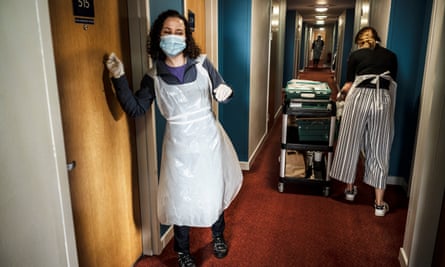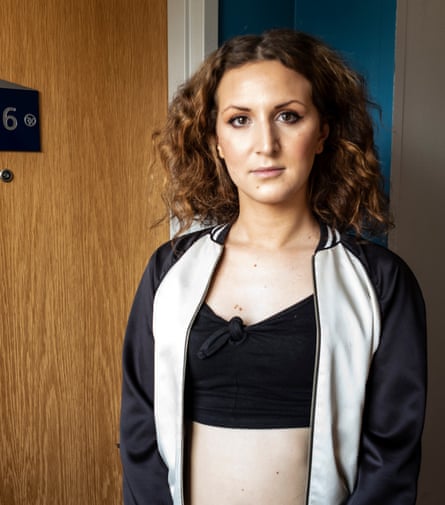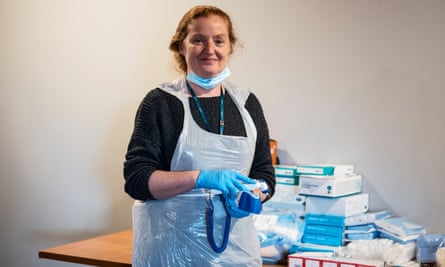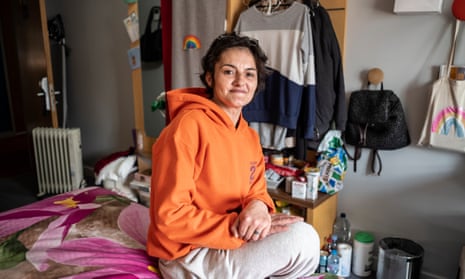To begin with, Clare Sutcliffe found the shift from sleeping in a doorway in Soho to a king-size bed in a central-London hotel very disorientating. After 15 months sleeping rough, she found it hard to relax and really believe she was in a safe space.
“The first couple of nights, I couldn’t sleep with the light off,” she says. “This might sound mad, but I was a bit scared. It was different; when you’re used to sleeping out in the open outside and then all of a sudden you’re in a bed, in a room, with a door that shuts.” When she arrived at the hotel five weeks ago, she was a skeletal six-and-a-half stone; since then, with three meals delivered to her room every day, her health has begun to improve.
“I was very, very underweight. Now I’m sleeping properly, eating properly, bathing properly,” she says. She is sitting in the hotel dining room with a few other guests and (at the appropriate distance) representatives from homelessness charities, who are helping the residents apply for permanent housing.
“I’ve never been anywhere quite like this,” Sutcliffe says, “and I never would have been able to if it weren’t for the circumstances. I came here with nothing. They’ve helped me with everything they possibly could – my benefits, birth certificate. I had no ID.”
Sutcliffe, 39, was brought up in children’s homes and became homeless 18 months ago after her partner died. Now she is enjoying spending the time in her room, watching television in bed – something she hasn’t been able to do for years – catching up on films she has never seen, enjoying Jurassic Park. In the morning, a newspaper is delivered to her room with breakfast; cleaners deliver fresh sheets once a week and come in to clean the room for her; laundry services are available. “It’s lovely,” she says.
Sutcliffe is one of more than 5,400 homeless people across England and Wales currently being housed in hotels at the government’s expense. It is part of an unprecedented emergency operation to get all rough sleepers off the streets, to prevent the spread of Covid-19. This hotel is one of almost 50 Travelodges, Ibis, Holiday Inns and smaller hotels in London (which were empty because of the disappearance of tourists and business travellers) that have been taken over by local authorities and charities.

The government claims this has been a “remarkable achievement”, with 90% of rough sleepers taken into hotels within the space of a few weeks. Volunteers providing hot meals to the hundreds of homeless who still congregate nightly around hotspots such as Trafalgar Square are much more downbeat, however. They have witnessed the growing numbers of newly homeless. Many of these people have started sleeping rough after losing jobs in restaurants and pubs because of the pandemic. None has been offered a hotel room, and, with day centres and cafes closed, all of them are finding conditions exceptionally harsh. Since businesses have shut down, there is no longer even a supply of cardboard to make sleeping on the pavement more bearable.
But if the operation is far from perfect, there is a defiant sense of optimism among those who have been working to reduce rough sleeping for years, at how much can be achieved, very quickly, once there is an injection of money and a government commitment to act. Homelessness charities are racing to work with those brought into hotels to try to make sure that, once lockdown ends and the hotels reopen to tourists and business travellers, they have lined up alternative, more permanent places for the rough sleepers to move to.
“We’ve been getting people coming in off the streets who haven’t been accommodated for years. Some of our staff have been in tears; there have been so many good news stories,” says Petra Salva, director of rough sleepers at St Mungo’s, which is running the operation in most London hotels. In 20 years spent working in homelessness organisations, she says she has never seen the sector coming together in the way it has over the past two months. “People say it’s not possible to end rough sleeping, but we’ve always maintained that it is, with the right attitude and money. But it is a gargantuan challenge.”
At lunchtime at an IHG hotel (which the Guardian has been asked not to name), the reception area looks much as it would do during more normal times. There are friendly, uniformed staff, politely helping guests who have lost their room keys, but there are also a few signs that the hotel is not operating quite as usual. The spare plastic key cards are floating in a plastic container, filled with transparent anti-bacterial liquid; the bar area is closed, and the beer taps have been wrapped up in cellophane to stop them being used. Security at the entrance has been stepped up to stop drug dealers moving in, and one guest is asking insistently whether staff have made any progress in finding him a pair of trousers that fit.

The hotel kitchens are closed, but Red Radish, a catering company that usually provides food to film sets, delivers hot meals, complete with vegan and halal options. St Mungo’s has recruited volunteers, from the lists of people who usually sign up for Crisis at Christmas shifts, and small teams, wearing masks and gloves, make their way around the 150-bedroom, six-floor hotel, knocking at doors and handing out meals in brown paper bags. They have a quick, friendly exchange, checking on residents’ moods, before moving on.
On the third floor is Sarah, 59, an Australian former chef who has lived in the UK for decades and has been street homeless for a number of years. She has come out of her room to talk to her next-room neighbour, 37-year-old Chelsea, to make arrangements for an evening walk together during their hour of approved exercise outside. Both women (who asked for their real names not to be printed) were brought here from a women’s hostel, where 12 women slept on camp beds in the same room.
“This is much more luxurious. My room is incredibly spacious; there’s room to do projects,” Sarah says, showing the patchwork blankets she has been knitting during lockdown, spread out over the bed and floor.

When news of the drive to put rough sleepers in hotels was announced at the end of March, there was predictable snarkiness on social media from people unhappy that the homeless were getting free holidays in suites at the Dorchester. This wasn’t quite the reality; this is a very nice, but basic, three-star hotel. “People got the wrong end of the stick,” says Salva. “But I’m delighted that people who have been on the streets are experiencing a bit of respite.”
“We’re safe, looked after, and we get our food provided for us,” says Chelsea. But she, like everyone here, is watching the news anxiously, wondering what will happen once the lockdown ends and the hotels return to normal use. Will they be “dumping people wherever?” she asks. “You can only hope for the best.”
Along the corridor, Daniella, 27 (who only wanted her first name to be used), had been living for a month in cardboard boxes under a canal bridge in north London since losing her bar job and the collapse of an abusive relationship. She has found the long hours of enforced isolation in her room hard. “I’m trying to be positive,” she says. “It’s lonely, I guess.”
Downstairs is Ganiyu Bello Ishola, 40, a former civil servant in the Nigerian ministry for local government. Until recently, he was mainly sleeping in a 24-hour branch of McDonald’s since becoming homeless because of complications with his immigration status. He is impressed by the government’s drive to bring homeless people inside. “I might have died if they hadn’t made a budget to rescue people from the streets,” he says. But, like everyone else, he is increasingly concerned about what will happen when the government ends the lockdown. “I don’t know where I’m going next,” he admits. “That does depress me sometimes.”
During our visit on Monday, the hotel seems remarkably calm. “The levels of behaviour have been what you would expect in a hotel, not a hostel,” says Samantha Dorney-Smith, a nurse with the Pathway charity, which lobbies for better healthcare for rough sleepers. She has been registering residents with GPs (often for the first time) and getting them help with drug, alcohol and mental health services. She describes the exercise as “a very interesting social experiment”. “If you give people what they want, they tend to take the sensible decisions. The whole focus has been on keeping people quiet and happy – and maybe we should continue like that, because, funnily enough, it works.”

There have been problems along the way, however. About 60 people have been asked to leave the hotels St Mungos is managing because they have done things such as removing fire alarms from their bedrooms. Some hotels were already providing emergency accommodation for local authorities, and were accustomed to challenging guests. Others have found it more difficult to know how to respond when people have had too much to drink and fallen down the stairs, or when new residents with undiagnosed mental health problems have had psychotic episodes and started shouting at staff. Or when drug dealers have managed somehow to make their way in. But the hotel workers have been amazing, St Mungo’s staff say, absolutely determined to help.
What there has not been much of is Covid-19. After a slightly chaotic start, arrivals were divided up and those with possible symptoms put in one hotel, those who had tested positive in another, and those with no virus concerns in the rest. People with really serious drug and alcohol issues have been housed separately. Only a handful of rough sleepers in London have had to go to hospital with coronavirus, and no one put into the hotel scheme has died. Given the vulnerability of people who have been rough sleeping for a while, this is a significant achievement, Dorney-Smith says.
But homelessness workers and hotel residents are equally worried about the dwindling amount of time before this period ends. Bethan Epps, the St Mungo’s worker who is managing this hotel, says: “It does make me anxious. We really, really don’t want people to go back on the streets after this.” She would like to have another two months, but is realistic about the prospect of finding homes for everyone. At least a quarter have no recourse to public funds, an immigration status that means, in non-pandemic times, they cannot receive any state support. If they are unable to get their jobs back, they will remain homeless. About 30 people in this hotel were living in Heathrow airport before lockdown, many of them with unresolved immigration issues; none would normally be eligible for any help from the either the government or homelessness charities.

The main problem is that the exceptional funding granted by the government (two tranches of £1.6bn given to local authorities to fund their Covid-19 response) has already been used. There are no more hotel beds for those homeless now, and no new long-term accommodation to put people in. St Mungo’s own research shows that government cuts have resulted in funding for drug and alcohol services being reduced by more than a quarter since 2015-16. It also revealed that there were 8,755 fewer places in accommodation for homeless people in 2019 than there were in 2010, and that funding for homelessness services has been cut by £1bn a year since 2008/9. The number of people dying while homeless has increased by 51% since 2013.
“We’re faced with a once in a lifetime opportunity of getting it right, and making sure that not one single person who is currently accommodated should go back on to the streets,” says Salva. “A few weeks ago, I thought this was a silver lining in a national tragedy – that this could be the prize, that we could actually get everyone off the streets. But that’s not going to be the case – London is going to be a challenge.” She is particularly worried by people falling into sleeping rough during the lockdown because their work has dried up and they have been asked to leave the accommodation that comes with their jobs.
Meanwhile conditions for those still on the streets have deteriorated rapidly during lockdown. In the first three weeks following the national lockdown orders, there was an 81% rise in alerts to StreetLink, the charity that connects rough sleepers with services. In London, hungry-looking people have taken to begging at car windows at traffic lights, something more usually seen in Delhi, a measure of desperation at a time of lockdown. An economic crisis will see new people on the streets.
“Very soon, we’re going to be in a situation where these amazing businesses that have opened up their hotels are going to want their businesses back,” says Salva. “It is not going to be an easy and quick fix to stop people from going back to the streets.”
Sutcliffe worries as she watches the news in her bedroom. “Once they say there’s no more lockdown, what does that mean? Pack your stuff, off you go?” she asks. “If there’s no accommodation sorted for me, then I’d be back out on the streets, simple as that. I’m hoping and praying that doesn’t happen.”
